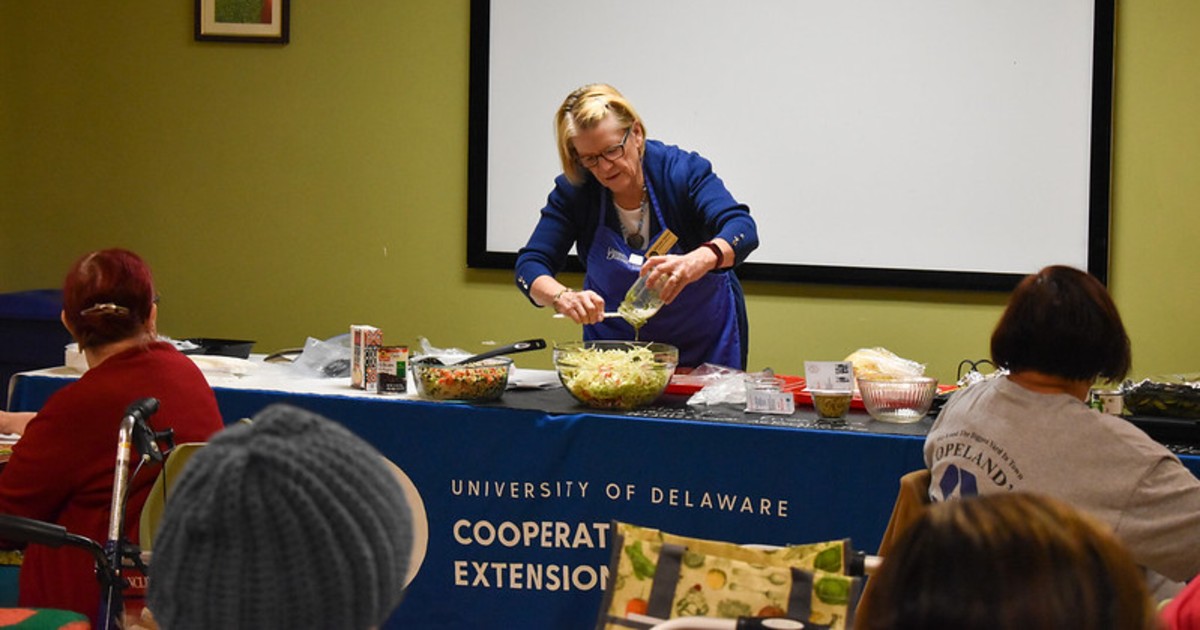
Category: Cooperative Extension

Learn to manage your diabetes online!
September 04, 2020 Written by Kimi Moore
About 11% of Delaware’s population has diabetes. When uncontrolled, diabetes can lead to complications such as heart disease, stroke, amputations and ultimately even death. Additionally, individuals with diabetes are at an increased risk for severe illness related to COVID-19, but this risk is likely lessened if their diabetes is well-managed. Diabetes education programs can help individuals better manage their diabetes and prevent complications, yet only 50% of Delawareans with diabetes have taken a class.
Dining with Diabetes is a five-part nutrition and cooking series for people with diabetes, their family members and support people, but is open to anyone — with or without diabetes. The program includes diabetes education-specifically around nutrition, cooking demonstrations and tasting of healthy foods.
Class Topics:
Class 1 — Diabetes Basics
Class 2 — Carbohydrates and Meal Planning
Class 3 — Fats & Sodium
Class 4 — Vitamins, Minerals and Putting it all Together
Reunion — Seasonal Topic
After each lesson, participants take home recipes and knowledge about managing diabetes in their daily lives. In 2019, 50 individuals enrolled in a Dining with Diabetes series were held twice in New Castle and Kent Counties and once in Sussex County. In addition, a series was conducted in Spanish in Wilmington for individuals who are associated with the Latin American Community Center. Twenty-eight participants attended that series.
The goal of Dining with Diabetes is to increase participant knowledge around foods that impact blood sugar. This is important as knowing how foods affect your blood sugar can allow individuals to choose foods to manage their blood sugar better and, therefore, better manage their diabetes.
Of the participants who attended the reunion, 92% are choosing smaller portions, 76% are cooking more at home and 72% use recipes from the program. “I learned how carbohydrates relate to my diet and diabetes. “I am more confident in my meal planning.” and “I learned that you don't have to stop eating regular foods to eat healthy.” These are only some of the positive changes that participants have anecdotally reported after attending Dining with Diabetes.
Unfortunately, due to COVID-19 and the limits on face-to-face programming, Dining with Diabetes in-person classes have been postponed at the University of Delaware Cooperative Extension (UDCE). The good news, though, is that much like many other UDCE programming, Dining with Diabetes is moving online to make sure we can still provide this critical information and support to Delawareans statewide. While the program won’t look the same, it will still provide many aspects that have made Dining with Diabetes so enjoyable and impactful. Dining with Diabetes online will be the core four sessions with an invite to an in-person reunion/tasting party later. The reunion/tasting party will allow the participants to meet other participants face-to-face and sample some of the delicious recipes prepared during the online lessons.
Dining with Diabetes online will be done through zoom. If you are new to zoom- don’t worry! We join the class early in the first lesson to help participants set up their zoom and prepare for the course. Like our in-person class, each online class begins with education on diabetes and nutrition and is followed by a cooking demonstration. Instead of showcasing different recipes, each classes’ cooking demo will feature several recipes to make up a healthy meal. Materials for the class-including copies of the PowerPoint, handouts and recipes, will be sent via email before the class. Questions and conversations between participants are encouraged throughout the class. We aim to make our Dining with Diabetes online a place for participants to learn the information they need to manage their diabetes better and receive the support to help them from our educators and their peers.
